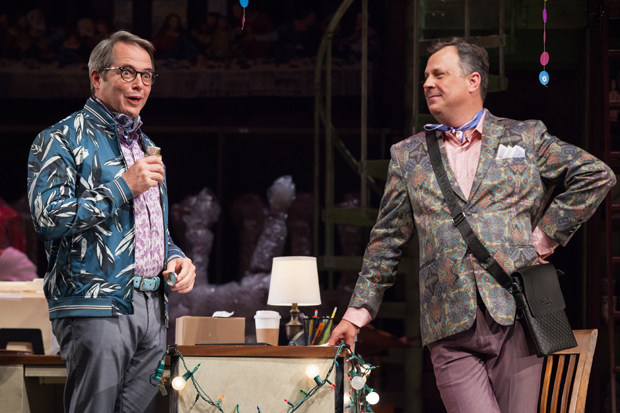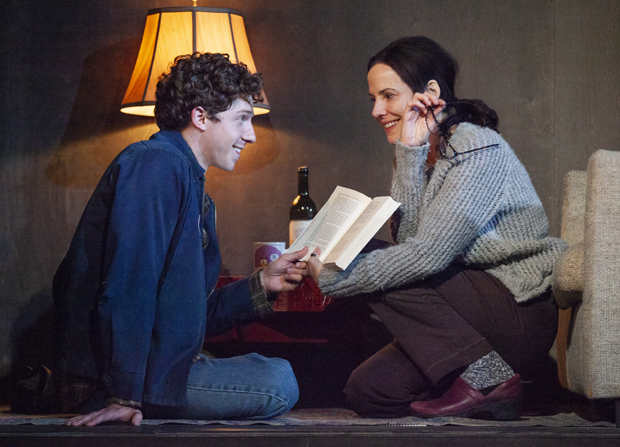At Williamstown, Matthew Broderick in The Closet and Mary-Louise Parker in The Sound Inside
New plays by Douglas Carter Beane and Adam Rapp receive their world premieres.

(© Carolyn Brown)
The 2018 summer season at Williamstown Theatre Festival is off to an auspicious start, presenting the best new plays in recent memory from Douglas Carter Beane and Adam Rapp.
Beane's The Closet, directed by Mark Brokaw on the Main Stage, is the perfect show for a muggy summer afternoon: light, breezy, and aiming only to make people laugh, which it does, in spades. Inspired by Francis Veber's film Le Placard, it tells the story of Martin O'Reilly (Matthew Broderick), recently divorced and about to be fired from his paper-pushing job at a religious-supply factory, until Ronnie Wilde (Brooks Ashmanskas) sashays into his life.
Ronnie, independently wealthy after winning a gay discrimination lawsuit, wants to rent part of the gothic mansion that Martin bought and renovated for his family (which instead drove them apart). Sad sack Martin agrees, and the second his back is turned, Ronnie hatches a plan to save Martin's job: Ronnie tells all of Martin's coworkers (Jessica Hecht, Ann Harada, Will Cobbs) that they're secretly husbands. And you can't possibly fire a gay man without fear of repercussions, can you?
What follows is an inspired farce as Martin's coworkers, and especially Martin's son (Ben Ahlers), suddenly begin to see him — and themselves — in all sorts of new ways. Harada is particularly hilarious as a gossipy office worker who discovers her true happiness when she realizes that she finally has a gay friend. Hecht is deliciously befuddled as the extremely politically correct coworker who has harbored a secret crush on Martin for years. Ashmanskas, who's so good he almost walks away with the show, is the definition of what one character says about him: "You talk like everything you say is written in cursive." In his performance, we know exactly what that means.
Broderick delivers one of his best performances in a long time, delightfully playing for and against type as a classic nebbish who embraces his newfound popularity to the hilt. There's a particularly great moment — one that will be the main takeaway memory of The Closet — where Martin discovers that the key to successfully acting gay is to sniff cinnamon for a jolt and float like you're walking on bubble wrap you're not allowed to pop. The physical comedy of this leaves the audience in stitches.
Though Beane's script could be a little tighter (it would pack more punch at 100 minutes as opposed to two-and-a-half hours), he has a way with one-liners, and The Closet is filled with delightful zingers aimed at race, class, and identity. It's practically the definition of a "forget your troubles" show, and it really does make us happy.

(© Carolyn Brown)
On the other end of the spectrum is Rapp's The Sound Inside, directed by recent Tony winner David Cromer on the Nikos Stage. A dark, piquant look at loneliness and legacy, the central character is Bella Baird (Mary-Louise Parker), a fiftysomething professor at Yale, who takes a liking to a mysterious student, Christopher Dunn (Will Hochman).
Christopher is working on a book and is desperate for Bella's expert guidance. Bella, who never married or had children, takes Christopher on as a mentee and perhaps sees in him a surrogate son. However, when a personal medical situation comes to light, she finds herself in desperate need of his assistance. But will he be willing to help?
Rapp, whose plays often have a tendency to feel half-finished, is in top form here, creating a tough, dense work that feels more like a recited novella than a traditional drama, where the text alternates between monologues and dialogues, in first and third person. His ornate style is expertly matched by Cromer's methodical direction, as well as the two scrupulously focused central performances. Parker, never better, is magnetic and compelling, while Hochman, a real find, is performing a delicate high-wire act of pent-up frustration and twentysomething angst. Their sensitivity is the perfect match for a delicate play that's always one step ahead of its audience — as any good work of fiction should be.







